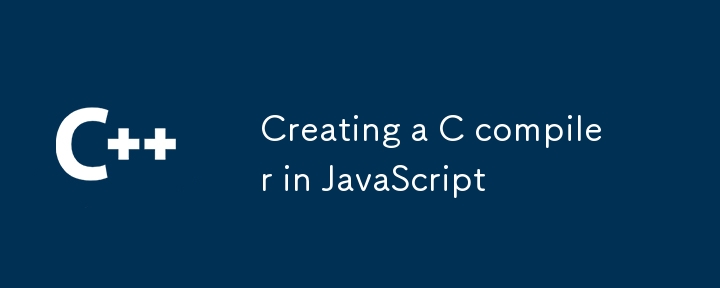JavaScript での C コンパイラの作成
- PHPzオリジナル
- 2024-07-18 01:42:311248ブラウズ

JavaScript での C コンパイラーの作成は、字句解析、解析、意味解析、コード生成などのいくつかのコンポーネントを含む複雑で野心的なプロジェクトです。以下は、そのようなコンパイラーの構築を開始する方法を示す、簡略化された高レベルの例です。この例では、C コードをコンパイルする最初のステップである字句解析 (トークン化) と解析段階に焦点を当てます。
ステップ 1: 字句分析 (トークン化)
字句解析器 (レクサー) は、入力 C コードをトークンのストリームに変換します。
class Lexer {
constructor(input) {
this.input = input;
this.tokens = [];
this.current = 0;
}
tokenize() {
while (this.current < this.input.length) {
let char = this.input[this.current];
if (/\s/.test(char)) {
this.current++;
continue;
}
if (/[a-zA-Z_]/.test(char)) {
let start = this.current;
while (/[a-zA-Z0-9_]/.test(this.input[this.current])) {
this.current++;
}
this.tokens.push({ type: 'IDENTIFIER', value: this.input.slice(start, this.current) });
continue;
}
if (/[0-9]/.test(char)) {
let start = this.current;
while (/[0-9]/.test(this.input[this.current])) {
this.current++;
}
this.tokens.push({ type: 'NUMBER', value: this.input.slice(start, this.current) });
continue;
}
switch (char) {
case '+':
this.tokens.push({ type: 'PLUS', value: '+' });
this.current++;
break;
case '-':
this.tokens.push({ type: 'MINUS', value: '-' });
this.current++;
break;
case '*':
this.tokens.push({ type: 'STAR', value: '*' });
this.current++;
break;
case '/':
this.tokens.push({ type: 'SLASH', value: '/' });
this.current++;
break;
case '=':
this.tokens.push({ type: 'EQUAL', value: '=' });
this.current++;
break;
case ';':
this.tokens.push({ type: 'SEMICOLON', value: ';' });
this.current++;
break;
case '(':
this.tokens.push({ type: 'LPAREN', value: '(' });
this.current++;
break;
case ')':
this.tokens.push({ type: 'RPAREN', value: ')' });
this.current++;
break;
default:
throw new TypeError('Unexpected character: ' + char);
}
}
return this.tokens;
}
}
ステップ 2: 解析する
パーサーは、トークンのストリームを抽象構文ツリー (AST) に変換します。
class Parser {
constructor(tokens) {
this.tokens = tokens;
this.current = 0;
}
parse() {
let ast = {
type: 'Program',
body: []
};
while (this.current < this.tokens.length) {
ast.body.push(this.parseStatement());
}
return ast;
}
parseStatement() {
let token = this.tokens[this.current];
if (token.type === 'IDENTIFIER' && this.tokens[this.current + 1].type === 'EQUAL') {
return this.parseAssignment();
}
throw new TypeError('Unknown statement: ' + token.type);
}
parseAssignment() {
let identifier = this.tokens[this.current];
this.current++; // skip identifier
this.current++; // skip equal sign
let value = this.parseExpression();
this.expect('SEMICOLON');
return {
type: 'Assignment',
identifier: identifier.value,
value: value
};
}
parseExpression() {
let token = this.tokens[this.current];
if (token.type === 'NUMBER') {
this.current++;
return {
type: 'Literal',
value: Number(token.value)
};
}
throw new TypeError('Unknown expression: ' + token.type);
}
expect(type) {
let token = this.tokens[this.current];
if (token.type !== type) {
throw new TypeError('Expected ' + type + ' but found ' + token.type);
}
this.current++;
}
}
ステップ 3: コード生成
最後に、コード ジェネレーターは AST をターゲット言語 (JavaScript またはその他の言語) に変換します。
class CodeGenerator {
generate(node) {
switch (node.type) {
case 'Program':
return node.body.map(statement => this.generate(statement)).join('\n');
case 'Assignment':
return `let ${node.identifier} = ${this.generate(node.value)};`;
case 'Literal':
return node.value;
default:
throw new TypeError('Unknown node type: ' + node.type);
}
}
}
すべてをまとめる
レクサー、パーサー、コード ジェネレーターの使用方法は次のとおりです。
const input = `x = 42;`;
const lexer = new Lexer(input);
const tokens = lexer.tokenize();
console.log('Tokens:', tokens);
const parser = new Parser(tokens);
const ast = parser.parse();
console.log('AST:', JSON.stringify(ast, null, 2));
const generator = new CodeGenerator();
const output = generator.generate(ast);
console.log('Output:', output);
これにより、入力がトークン化され、AST に解析され、AST から JavaScript コードが生成されます。
注記
この例は非常に単純化されており、C 言語のごく一部のみを処理します。本格的な C コンパイラでは、はるかに大規模なトークンのセットを処理し、複雑な式、ステートメント、宣言、型を解析し、より洗練されたコードを生成する必要があります。
以上がJavaScript での C コンパイラの作成の詳細内容です。詳細については、PHP 中国語 Web サイトの他の関連記事を参照してください。
声明:
この記事の内容はネチズンが自主的に寄稿したものであり、著作権は原著者に帰属します。このサイトは、それに相当する法的責任を負いません。盗作または侵害の疑いのあるコンテンツを見つけた場合は、admin@php.cn までご連絡ください。

